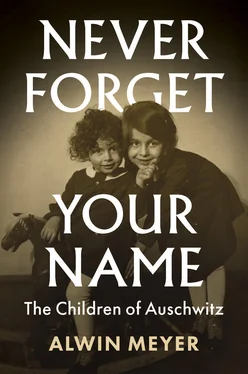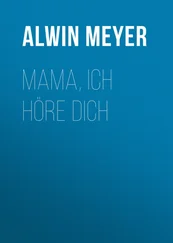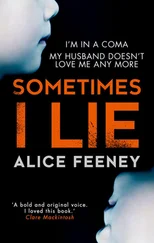The anti-Jewish climate was stirred up in particular by the press, which was predominantly financed by the Germans. The ‘solution of the Jewish problem’, as it was cynically known, was on the agenda of various pro-Nazi parties and Christian churches. And the Hungarian army was extremely antisemitic. 47‘My father was forced to reduce his business activities. Jews were not allowed to sell heating fuel. He was able to continue trading in building timber and roof tiles. We were still relatively comfortable.’ Many Jews who had fled to Hungary from Slovakia lived in the town. It was forbidden to help them. That didn’t bother Otto’s mother: ‘She refused to be intimidated and helped all refugee Jews with food, clothing and everything they needed.’
Otto and Ferenc could sense that their parents were becoming more and more worried as time went by. The wanted these uncertain times to end and asked themselves: ‘When will the war be over?’ ‘When will the Germans lose the war?’ It was fairly clear to them that that would be their only salvation.
‘Unfortunately, the Hungarian Jews were far too trusting of the Hungarian government and other nations. But what happened was still unimaginable for most people.’
Yehuda Bacon Even before the Germans invaded Czech Sudetenland in October 1938, the 8-year-old Yehuda Bacon was already aware that there were changes taking place in Europe. He recalls that, after Austria’s annexation to the Reich in March 1938, 48Jews from there fled to Poland via his hometown of Ostrava. One of them came to his father’s leather factory asking for alms. He told of the ‘brutality of the German and Austrian Nazis’ and wanted to ‘open the eyes of the world’ with his descriptions.
At the end of 1938, the Bacon family obtained the addresses from the Jewish community of people who had fled to Poland to whom packages could be sent. The wife of the rabbi to whom the Bacons sent food wrote back and said that the package was like a ‘straw in the ocean to which she clutched to prevent herself from sinking’. And an acquaintance informed them from Poland: ‘Our wardrobe consists of a nail on which I can hang all of my possessions.’
‘That’s the situation in Poland’, thought the family, ‘but it couldn’t happen here. That was the feeling at the time.’
The extent to which we were mentally unprepared is demonstrated by the fact that when the German troops occupied the town, we children stood at the side of the road as the tanks rolled in, trying to touch them because we had heard at home that they were made of cardboard. In addition, the jubilation – as it appeared to us – and the sea of swastikas made a deep impression, and we were keen to obtain franked envelopes from the post office with the inscription: ‘The city of black diamonds [the city had large coal reserves] thanks the Führer – Day of Liberation!’ 49
The consequences were also felt in Ostrava: the rights of the Jewish inhabitants were gradually reduced and ultimately removed entirely.
Yehuda Bacon’s family were very scared of raids. ‘The houses of Jews were searched, and every pretext was used to enter and check an apartment.’ When the Bacons were eating fruit once, a few drops splashed onto the floor. They were wiped up immediately ‘because we Jews weren’t allowed to buy fruit’. ‘Aryan’ friends had obtained it for them.
One day the Gestapo searched the Bacons’ apartment. They found a slab of butter ‘which a Polish engine driver had brought us’. He had forgotten his coat. Yehuda’s mother had the presence of mind to put it around her shoulders so it wouldn’t be noticed. Yehuda’s father was summoned to appear, because of the butter. He went to the Jewish community to ask for support, and it intervened with the Gestapo. After a while, Isidor Bacon was able to return home. He had been interrogated by two Gestapo men. But when he was alone with one of them, he was told: ‘Don’t worry, nothing will happen to you.’
In early 1939, the Jewish inhabitants were registered for forced labour. In the middle of the year, two synagogues were set on fire by the Nazis. 50Then, in October, 1,192 Jews were transported from Ostrava to Nisko in Poland, where they were supposed to build a camp. The project was abandoned in April 1940 and several hundred Jewish men were returned to Ostrava. 51A few years later, Majdanek concentration camp was established in Lublin, 100 kilometres north of Nisko.
Dagmar Fantlová The 8-year-old Dagmar also first learned that ‘something was going on in Germany’ around 1937. ‘A man, probably a rabbi, turned up in Kutná Hora. He was from Germany, I don’t remember which part. He had published a book. I can only recall the cover. It showed a man with a sign behind a gate on which was written: “Jude verrecke im eigenen Drecke” [May the Jews croak in their own filth].’
Dagmar heard people saying that some people were sending their children to England. This was barely discussed in her family. She and Rita were still too small. They had an aunt who wanted to emigrate with her husband, but somehow never managed to do so.
Later, there was a young man from the border region, from Cheb [Eger in German]. His parents had emigrated and he was meant to follow them later, but he didn’t manage to do so. He arrived on his own in Kutná Hora. My parents invited him for lunch every Sunday. He would always say that he wouldn’t go to the Theresienstadt camp and ghetto. But that’s where he ended up. My father said to him in Theresienstadt: ‘You see, you’re here after all.’ He replied: ‘There’s still a way out.’ But he never came back.
In early 1939, the rabbi from Germany disappeared from Kutná Hora as suddenly as he had arrived. It marked the start of a new series of events. On 15 March 1939, German troops entered Kutná Hora. ‘My father came to my bed early in the morning. He woke me and said: “We’ve lost the republic.” He was crying. This was something quite out of the ordinary for me. I’d never seen my father cry before.’ Dagmar got up and went to school. Nothing had changed there. ‘Only the weather was bad that day.’
When she came home at lunchtime, her father spoke about a visit to a patient. ‘He was driving on the left-hand side of the road. That’s how it was in those days. A German column was coming in the other direction, driving on the right. They stopped him and told him he should drive on the right.’ Julius Fantl came home in ‘deep shock’.
One day – it must have been a holiday – the Sudeten German lodger Zotter said to Julius Fantl: ‘I’d like to hang out the swastika flag.’ Dagmar’s father replied: ‘Herr Zotter, I’m sure you know that swastikas are not allowed to be flown in Jewish houses.’
‘I’d just hang it between the windows.’ And that’s what he did. Some time later, Zotter became the trustee of the shoe factory where he worked. This meant that all of the previous owners’ rights were extinguished and transferred to the trustee. 52Now he wanted to live in the house of the Jewish owner, which also contained the Jewish community offices. Zotter ordered the Jewish community to move to Julius Fantl’s house.
One of the Jewish families in Kutná Hora had to move out of their home. ‘They came to us, in the grandparents’ rooms. They moved into our apartment.’ On 23 October 1939, the order was given to dismiss all Jewish employees. And on 26 January 1940, Jews were forbidden from managing textile, shoe and leatherwear businesses. This and other measures, such as the obligation to register the company (7 February) and the employer’s private assets (16 March), were important steps towards ‘Aryanization’, as it was called. What followed was the expropriation of the Jews on a grand scale. 53
Eduard Kornfeld When he was 6 or 7 years old, Eduard first experienced ‘something like antisemitism’ as he was on his way to school. Children called him a ‘Saujude’ [‘Jewish pig’]. And on the walls would be scrawled ‘Zydy do Palestuny’ [‘Jews to Palestine’].
Читать дальше












